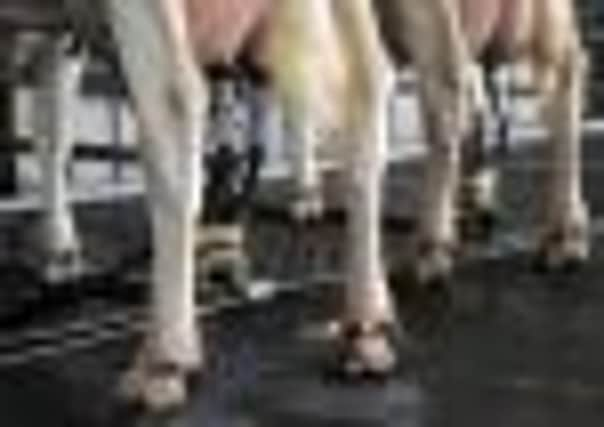Farmers hit by ‘perfect storm’ of plunging dairy prices


Four years ago, the farmer, from West Galdenoch, near Stranraer, invested £1 million in a milking parlour and now has his own 550-head herd.
At the time it seemed like a good investment – Britain is a nation of milk-lovers and the UK was producing well under its quota of dairy products – but since then dairy farmers have been hit by a “perfect storm”.
Advertisement
Hide AdAdvertisement
Hide AdRising feed and fuel prices, falling cream prices and restrictive practices within the industry have led to a situation where UK farmers are being paid less for their milk than it costs to produce. Many, like Gary Mitchell, are wondering how they will survive.
The farmer, who is the milk committee chairman of the National Farmers Union in Scotland, says: “It’s frustrating. In the last month feed prices rose again by 2p a litre. You wonder where it is going to end.”
Mitchell sells his milk products to Nestlé, which uses it to make the chocolate coating on Kit Kats. He gets 26p a litre for it but reckons it costs 27p a litre to produce. He and other Scottish farmers have been protesting about the fact that milk is now cheaper than bottled water.
Recent protests by the farmers have led to a groundswell of support from consumers, with many saying they would be prepared to pay higher prices to support the industry.
A recent survey by trade publication The Grocer found that 67 per cent of consumers would be prepared to pay more for milk if it meant a fairer deal for consumers. Almost 20 per cent said they would change the way they buy milk after the farmers’ protests.
Farming minister Richard Lochhead believes the public is behind their campaign for a fairer price for milk, even if it means the consumer will have to pay more.
And yet the price of milk continues to be absurdly low. Two years ago four pint bottles of milk cost an average of £1.53 – now the price is £1.18. Recently ASDA announced it was discounting a four-pint jug to £1.
Analysts say supermarkets are “obsessed” with the price of milk and the price of bananas – believing cheap prices for their best-selling everyday products create a “halo of value” which extends to other ranges across their stores.
Advertisement
Hide AdAdvertisement
Hide AdBehind-the scenes-battles between the supermarkets and the processors are believed to have kicked off the drive to undercut the farmers.
But there are other factors. Prices for milk, cream and milk powder are subject to the fluctuations of the global commodities market, with rising demand from China and a huge rise in demand for skimmed milk products helping to destabilise the markets.
And although the supermarkets have been blamed they, have also been doing their bit to support the farmers, with Tesco paying higher prices to farmers than anyone else in the market.
Andrew Opie, director of food for the British Retail Consortium, which represents the supermarkets on the issue, said: “Supermarkets are the best payers in the milk market. Supermarkets only sell British milk, but their customers don’t need all the milk produced by UK dairy farmers. Only half of the milk British farmers produce ends up as liquid milk in bottles and cartons and only part of that is sold in supermarkets, the rest is sold by convenience stores, door-to-door or used in catering, schools and prisons.
“A number of supermarkets have dedicated milk supply chains which allow them to work closely with specific groups of farmers, guaranteeing how much the farmers get for their milk and helping them invest in the long-term sustainability of their businesses. That matters to retailers who want successful relationships that will provide the milk they and their customers need, not just now, but over the coming decades. But that can’t be the answer for every farmer.
“The pressure should be on other big buyers of milk – food manufacturers and the public sector – to show the same strong support for the industry that retailers do. The truth is, the farmers in the best position are often those in supermarket supply chains.”
Although some research has suggested that consumers would be prepared to pay more for milk, he said he believed it was important to keep prices down.
‘We don’t believe that hardpressed families struggling on a budget will want to see any prices going up. Retailers will do everything possible to deliver value and avoid unnecessary food inflation. At the same time, we recognise farmers need to be rewarded for their hard work and that’s why we pay by far the highest prices for our milk. This is a win-win situation, best prices for both consumers and farmers.”
Advertisement
Hide AdAdvertisement
Hide AdSo will consumers inevitably have to pay more for their daily pint? Or are there other reasons why the price of milk is so low.
Jim Begg, director-general of Dairy UK, which represents the big milk processors such as Wiseman, Arla, First Milk and Dairy Crest, believes the UK may have to rethink its attitude to daily staple foods.
He says: “We operate in the UK with a cheap food policy. They don’t operate like that in other countries. There are different ways of looking at food. In France and Germany they value food more and are prepared to pay more for it.
“In the long term, we need to think about how to create a sustainable industry.”